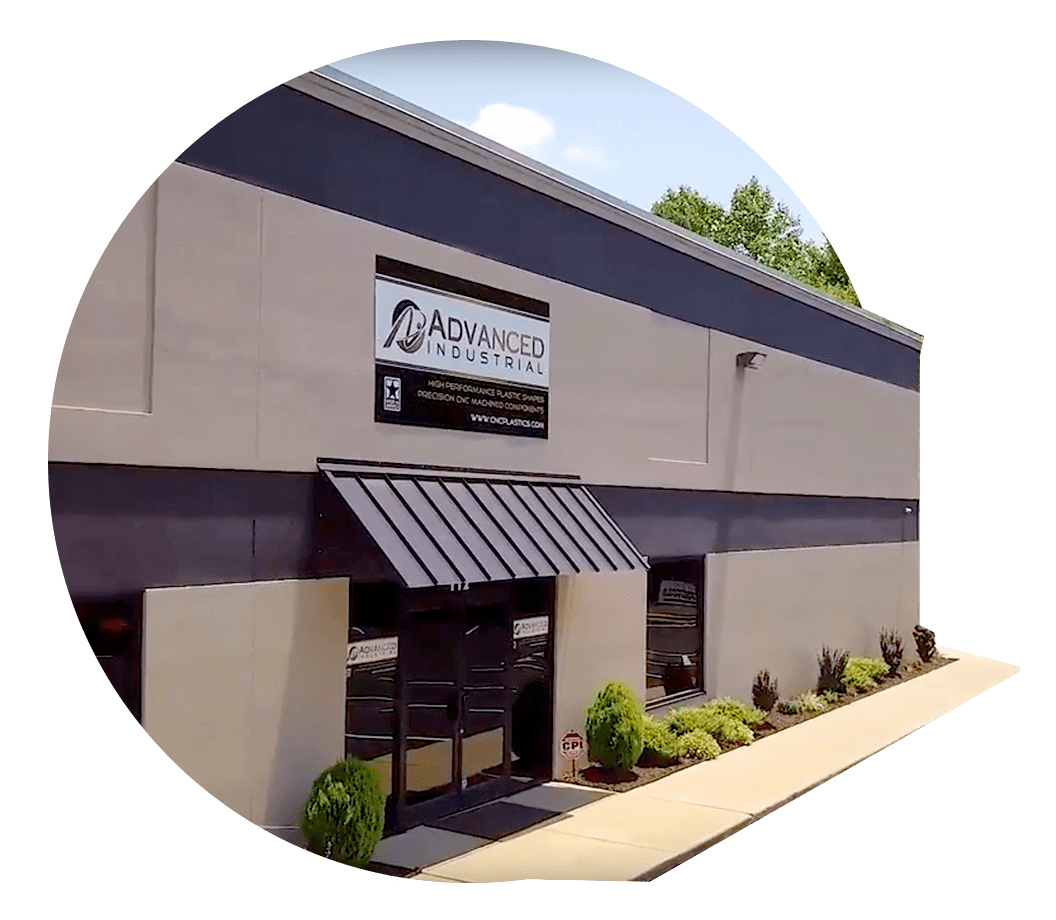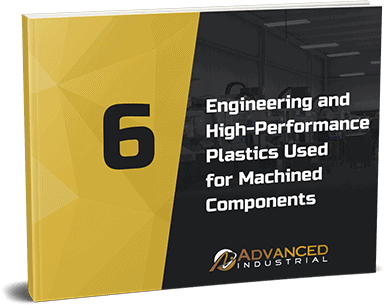O-rings are one of the most common and critical types of seals used in machine design. An o-ring is a loop of elastomer with a round, or O-shaped, cross-section designed to be seated in a groove and compressed during assembly between two or more parts, creating a seal at the interface.
While many o-rings are made from rubber compounds, demanding applications require a material with superior chemical resistance, a wider temperature range, and lower friction. That’s where Polytetrafluoroethylene (PTFE), commonly known by the brand name Teflon®, excels. Advanced Industrial CNC machines high-performance, custom PTFE o-rings for the most challenging industrial environments.
Why Use Teflon®/PTFE for O-Rings?
PTFE is not an elastomer and has little to no memory, meaning it’s best suited for static sealing applications or very slow, dynamic uses. However, its unique properties make it the ideal choice when other materials fail.
- Exceptional Chemical Resistance: PTFE is virtually inert to almost all industrial chemicals, solvents, and corrosive agents. This makes PTFE o-rings perfect for chemical processing, pharmaceutical, and semiconductor applications.
- Wide Temperature Range: Teflon® o-rings can perform reliably in extreme temperatures, from cryogenic conditions at −200∘F (−128∘C) up to 500∘F (260∘C).
- Low Coefficient of Friction: PTFE has one of the lowest friction values of any solid material. This “slipperiness” reduces wear and energy consumption in any moving parts of a system.
- No Swelling or Moisture Absorption: Unlike many elastomers, PTFE does not swell or degrade when exposed to moisture, ensuring dimensional stability and a reliable long-term seal.
PTFE Material Grades for O-Rings
The optimal material for your o-ring depends entirely on the application’s specific demands for pressure, temperature, and media. We machine o-rings from various PTFE grades to meet your exact requirements.
| Material Grade | Key Characteristics & Benefits | Common O-Ring Applications |
| Virgin PTFE | FDA compliant, excellent insulator, most chemically resistant grade. | Food & beverage, medical devices, pharmaceutical processing, high-purity systems. |
| Glass-Filled PTFE | Improved wear and compressive strength compared to virgin PTFE. Good chemical stability. | Sealing against acids and other corrosive chemicals. |
| Carbon-Filled PTFE | Excellent compressive strength, wear resistance, and low deformation under load. Not a good electrical insulator. | High-pressure seals, dynamic applications where high wear resistance is needed. |
| Bronze-Filled PTFE | Highest wear resistance and compressive strength of all filled grades. Good thermal conductivity. | Hydraulic systems, high-load bearing seals. |
| Graphite-Filled PTFE | Enhanced wear properties and a low coefficient of friction. Good for high-speed applications. |
Self-lubricating seals, dynamic applications requiring low friction. |
Common Applications for PTFE O-Rings
Our precision-machined PTFE o-rings are critical components in a wide range of industries and equipment where performance and reliability are non-negotiable. Here are some examples of industries using PTFE O-Rings:
Chemical Processing: Teflon o-rings serve as essential sealing components in pumps, valves, reactors, and process piping systems that handle highly aggressive chemicals, acids, bases, and solvents. The exceptional chemical inertness of PTFE makes these o-rings ideal for applications involving hydrofluoric acid, chlorine, strong oxidizers, and other corrosive media that would rapidly degrade conventional elastomer seals. Chemical processing facilities rely on Teflon o-rings to maintain leak-tight seals in heat exchangers, distillation columns, and filtration systems where exposure to extreme pH levels and reactive compounds is routine. The material’s ability to maintain its sealing properties across a wide temperature range makes it particularly valuable in processes involving thermal cycling, steam cleaning, and high-temperature chemical reactions.
Aerospace: The aerospace industry demands sealing solutions that can withstand the extreme conditions encountered in flight operations, from the frigid temperatures of high altitude to the intense heat generated by engine systems. Teflon o-rings are extensively used in aircraft fuel systems, where they must resist aviation fuels, hydraulic fluids, and lubricants while maintaining reliable sealing performance across dramatic temperature variations. These PTFE seals are critical components in hydraulic actuators that control flight surfaces, landing gear systems, and engine controls, where failure is not an option. Space applications require Teflon o-rings in rocket engines, satellite systems, and spacecraft life support equipment, where they must function in the vacuum of space while resisting radiation exposure and extreme thermal cycling between sunlight and shadow.
Food & Beverage: Food processing and packaging operations require sealing materials that meet strict FDA compliance standards while maintaining sanitary conditions and preventing contamination. PTFE o-rings are widely used in food-grade pumps, valves, and processing equipment where they come into contact with consumable products, cleaning chemicals, and sterilizing agents. These applications include beverage bottling lines, dairy processing equipment, brewing systems, and pharmaceutical-grade water treatment systems. The non-stick properties of Teflon prevent bacterial growth and facilitate thorough cleaning, while the material’s resistance to steam sterilization and chemical sanitizers ensures long-term reliability in environments where hygiene is paramount. PTFE o-rings are also essential in filling equipment, pasteurization systems, and high-pressure homogenizers used in food production.
Semiconductors: The semiconductor manufacturing industry requires ultra-pure environments where even trace contamination can destroy valuable wafers and compromise product yields. Teflon o-rings are critical sealing components in chemical vapor deposition chambers, plasma etching equipment, and wet processing stations where they must resist highly corrosive gases and ultra-pure chemicals while maintaining vacuum integrity. These seals must function reliably in the presence of aggressive chemicals like hydrofluoric acid, sulfuric acid, and various organic solvents used in wafer cleaning and etching processes. The low outgassing properties of PTFE make it ideal for vacuum applications, while its chemical inertness prevents contamination of the ultra-clean manufacturing environment. Teflon o-rings are also used in gas delivery systems, chemical storage tanks, and analytical equipment where maintaining chemical purity is essential.
Medical & Pharmaceutical: In medical and pharmaceutical applications, PTFE o-rings provide reliable sealing in analytical instruments, diagnostic equipment, and drug manufacturing systems where precision and sterility are critical. Custom Teflon seals are commonly found in chromatography systems, mass spectrometers, and automated laboratory equipment where they must resist cleaning solvents, biological fluids, and sterilizing agents. Pharmaceutical manufacturing relies on PTFE o-rings in tablet presses, capsule filling machines, and sterile processing equipment where they must withstand steam sterilization cycles and aggressive cleaning protocols. The biocompatibility of Teflon makes it suitable for medical devices and implantable equipment, while its chemical resistance ensures compatibility with pharmaceutical compounds and prevents leaching that could compromise drug purity.
Oil & Gas: The petroleum industry subjects sealing components to some of the most challenging conditions imaginable, including high pressures, extreme temperatures, and exposure to crude oil, natural gas, drilling muds, and completion fluids. Teflon o-rings are essential components in downhole equipment, wellhead assemblies, and production systems where they must maintain reliable sealing performance in environments that can reach temperatures exceeding 200°C and pressures of thousands of PSI. These PTFE seals are critical in blowout preventers, drilling equipment, and subsea systems where failure could result in environmental disasters and equipment loss. The chemical resistance of Teflon makes it particularly valuable in applications involving sour gas containing hydrogen sulfide, carbon dioxide, and other corrosive compounds that rapidly attack conventional sealing materials. Custom PTFE o-rings are also used in refinery equipment, pipeline systems, and storage facilities where long-term reliability and chemical compatibility are essential for safe operations.
Advanced Industrial’s PTFE O-Ring Machining Capabilities
Standard, molded o-rings are limited to specific sizes and materials. At Advanced Industrial, we leverage state-of-the-art CNC machining technology to produce custom PTFE o-rings to your exact specifications, ensuring a perfect fit and optimal performance.
Our expertise allows us to create non-standard o-ring profiles, sizes, and diameters from the ideal PTFE material for your application. We maintain tight tolerances to guarantee a reliable seal, even in the most demanding high-pressure or high-temperature environments.
We make the following products in Teflon / PTFE:



